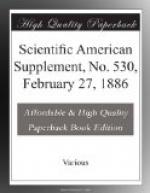In making reports for contingent fees or fees of contingent value, the young engineer needs to exercise great discretion. This may be done without impropriety if done openly; but it is safe to assume that few opportunities will come to the young man with a reputation still to make in which he can do clean and creditable work on any such basis. The engineer called upon to make a report for a fee in stock which depends for its value upon the effect of his report in creating confidence in the public mind, takes a fearful risk. However honest he may be, he places himself in a position in which the danger is obvious and the advantage uncertain. If, having a contingent interest in the result of his work, he is afraid to say so in his report, he may safely consider his position unprofessional and unsafe. Contingent fees are a delusion and a snare, and in making it a rule to refuse them the young engineer will be likely to gain more than he loses.
Reports intended to influence the public upon subjects concerning which the engineer knows himself unqualified to speak with authority are to be classed with other forms of charlatanry. No man can claim infallibility of judgment, nor is this expected of the engineer, whatever his position; but those who pay for professional services have a right to demand that the man who assumes to speak as an expert shall have the special knowledge which will command for his opinion the respect of those who are well informed. I consider it unprofessional for the engineer to enter upon the discharge of any duties for which he knows he is not qualified, if for the satisfactory discharge of those duties he must assume a knowledge he does not possess. There has been an immense amount of unprofessional work done in the field of reporting, and many reputations have been blasted by a failure to draw nice distinctions in questions of professional honor. The young engineer cannot be too careful in this matter, and he will be fortunate if, with all the prudence he can exercise, he is able to avoid disaster. Of a professional reputation dependent upon the accuracy as well as the honesty of reports ordered and used for speculative purposes, one may say as a marine underwriter lately said of an unseaworthy steamer, that he “would not insure her against sinking, from Castle Garden to Sandy Hook, with a cargo of shavings.”




